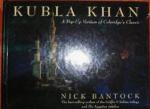|
This section contains 3,291 words (approx. 11 pages at 300 words per page) |

|
SOURCE: Frieden, Ken. “Conversational Pretense in ‘Kubla Khan.’” In Modern Critical Views: Samuel Taylor Coleridge, edited by Harold Bloom, pp. 209-16. New York: Chelsea House Publishers, 1986.
In the following essay, originally published in 1985, Frieden presents a rhetorical analysis of “Kubla Khan” as it both demonstrates and undercuts Coleridge's conversational poetic mode.
Coleridge's conversation poems extend the conventions of dramatic soliloquy to an apparently autonomous lyrical form. Dramatic soliloquy and poetic monologue both generate illusions of individual speech, yet the difference in genre has decisive implications. In the dramatic context, soliloquy retains mimetic pretensions as part of a represented world, while the written conversation poem tends to draw attention to its own representational illusion. The poetic monologist is typically less concerned to describe the world than to reflect on the experiences that constitute it.
Coleridge, whose finest lyrics are representative of the Romantic monologue, writes most enthusiastically of Shakespeare's...
|
This section contains 3,291 words (approx. 11 pages at 300 words per page) |

|


